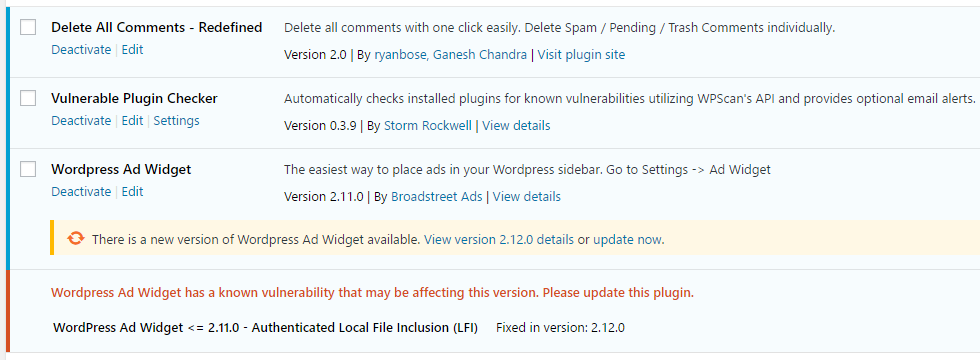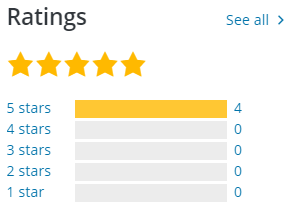Plugin Using WPScan Vulnerability Database Data Doesn’t Warn When Using Unfixed Vulnerable Plugins
While we think that our service provides the best data on vulnerabilities in WordPress plugins, for many websites paying for a service to warn about the use of vulnerable plugins is probably not in the cards. You can always use the companion plugin for our service, which includes data on vulnerabilities in plugins that are being targeted by hackers. But what if you are looking for more broad based vulnerability data? That is where data from the WPScan Vulnerability Database can be good alternative, since there is no cost for access to their data (though some services actually charge for accessing that data). It is important to note that their data has some serious quality issues, including it not warning about vulnerabilities that are included our plugin’s data despite that being for vulnerabilities that are being exploited and the data being freely accessible (if you use a plugin or service that uses their data you will want to combine it with our plugin to protect you from this situation).
There are a number of plugins that provide access to that data, but as we found yesterday while preparing a post about another problem with WPScan’s data, not all of those plugins are equal and in the case of one them it is not providing important warnings.
While looking to show an example of one of them incorrectly warning about a vulnerability due to WPScan’s data indicating that a plugin was vulnerable when it wasn’t, we found that one of them, Vulnerable Plugin Checker, wasn’t providing a warning. We then tried to figure out what was going on and found the plugin will not provide any warning that a plugin is vulnerable if the vulnerability hasn’t been fixed. That is pretty serious issue since the most important use of this type of data is to warn when a vulnerability hasn’t been fixed, since if it has been fixed, simply keeping your plugins up to date will protect you even if you are not aware of the vulnerability.
To show what the cause is, let’s take a look at part of the code that adds a warning to a plugins listing on the Installed Plugins page, which is handled in part by the function admin_head(). The code checks to see if the plugin is known to be vulnerable with this line:
350 | if ( isset( $plugin['is_known_vulnerable'] ) && 'true' == $plugin['is_known_vulnerable'] ) { |
The determination if it is vulnerable is handled with the following check in the function get_cached_plugin_vulnerabilities() (a substantially similar one is in the function get_fresh_plugin_vulnerabilities()):
151 152 153 154 155 | // if plugin fix is greater than current version, assume it could be vulnerable $plugin['is_known_vulnerable'] = 'false'; if ( version_compare( $vulnerability['fixed_in'], $plugin['Version'] ) > 0 ) { $plugin['is_known_vulnerable'] = 'true'; } |
For a plugin that hasn’t been fixed the value of $vulnerability[‘fixed_in’] in that will be null, so the plugin is considered to not be known to be vulnerable. Because the plugin is not considered to be vulnerable, no warning will be provided.
The end result of that if someone is relying on this plugin they would not be warned if, for example, they were using the latest version of Delete All Comments, despite a serious vulnerability in that, which was discovered by a security company after it was used to exploit a website:
We have notified the developer of the plugin through the WordPress Support Forum of the issue, so hopefully for those relying on the plugin it will get fixed quickly. If you are using another plugin or service that relies on WPScan’s data it would be a good idea to check if they are properly handling this type of situation and otherwise properly handling the use of WPScan’s data (in one other case we found a security company was misusing their data on vulnerabilities in WordPress and making false claims about WordPress websites being insecure).
Non-Independent Reviews
For a plugin that seems to have such a fundamental problem, taking a quick glance at its page on the Plugin Directory it might be surprising to see that it has received only five stars reviews:
While it is possible that independent reviewers might not have noticed this issue, in this case it looks like most of the reviews come from problematic sources. One comes from the developer of the plugin, another one comes from what looks to be their brother, and another one comes from account that looks like it was created just to post the review, which often is an indication that it isn’t an independent review. This seems like a good reason for those connected with a plugin to not be reviewing their own plugins, as it provides a skewed view of the plugin (would they ever give the plugin a poor review?).

